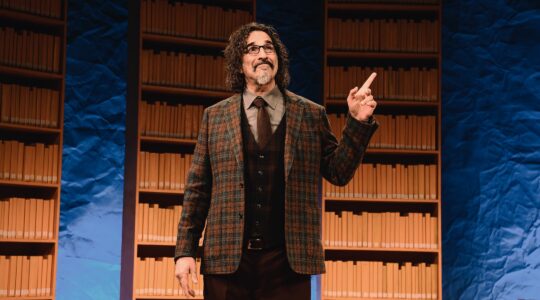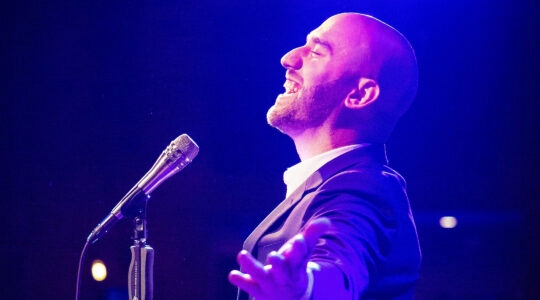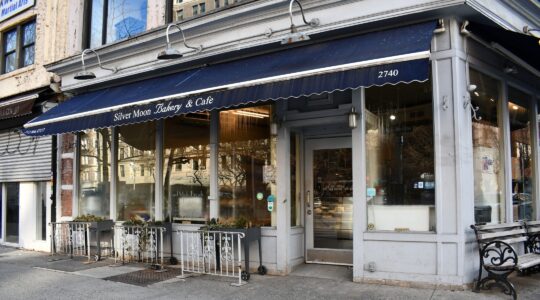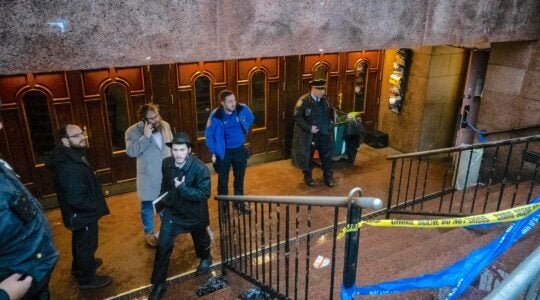On the surface it was a typical weekday evening at the Café Edison. The evening rush was thinning out but there was still a steady flow of matzah ball soup, blintzes, borscht, kasha varnishkes and rice pudding making its way to diners, with an equally steady flow of empty plates and bowls returning to the kitchen.
The restaurant’s manager and his wife, Conrad and Harriet Strohl, were bustling around the surprisingly spacious and labyrinthine interior of the coffee shop, schmoozing with the regulars, chatting with newcomers and staff.
It looked like a Thursday night from any of the past 34 years of the eatery’s existence on West 47th Street, except for the presence of a documentary filmmaker and the abrupt but delightfully raucous addition of a trio of top New York-based klezmorim. Opposite the cashier’s station, across from the interior doorway that leads to the lobby of the adjoining Hotel Edison, drummer Eve Sicular counted, and suddenly Michael Winogrand’s clarinet and Art Bailey’s accordion erupted into a frailach, to the immense amusement of the Strohls and their customers.
Sicular and Winograd could be playing a dirge pretty soon. The coffee shop is owned by the Triumph Hotel Group, the proprietor of the Hotel Edison, and the company has declined to offer the Strohls a new lease.
Spokespersons for the hotel have been unavailable for comment. The Edison’s general manager issued a statement earlier in the month that said, “We can confirm that the café is closing as the hotel prepares for a multimillion-dollar investment to upgrade and restore the space.”
The Café Edison may be the next victim of the ongoing transformation of Midtown Manhattan into a tourist-friendly theme park.
What is at stake is not just another coffee shop. One of the last affordable independent eating places in the theater district, its clientele has traditionally run the gamut from local working folks to show business types, with a heavy preponderance of Jewish entertainment figures including the likes of Jackie Mason, Emmanuel Azenberg and Neil Simon (whose play, “45 Seconds from Broadway” is based on the restaurant and its denizens). The Pulitzer-winning playwright August Wilson wrote dialogue for his dramas on the café’s paper napkins, and more deals were done here than in a more famous high-end restaurant ten blocks away, giving the Edison its nickname, “The Polish Tea Room.”
The coffee shop’s roots were, indeed, in Poland. Harry and Frances Edelstein, who managed the place from its inception in 1980, had survived the Nazi occupation by hiding in the woods for the duration of the war. They had seen their families murdered by German troops, narrowly missed the same fate themsleves, and eventually came to the United States, settling in Brooklyn.
Another Jewish survivor of the Shoah, Ulu Barad, a hotelier whose holdings included the Edison, invited them to run a café adjacent to his hostelry. Set in a converted ballroom, the café’s décor would be a singular cross between the hotel’s snazzy art deco furnishings and a typical formica-and-plastic neighborhood coffee shop. The Edelsteins were happy to join their former neighbor.
The original lease only ran through 1984 but their handshake agreement with Barad lasted beyond Harry’s death in 2009 at age 91 and Barad’s death at 88 last year. Barad’s son Gerard, head of Triumph Hotel Group, is the current owner. Frances is still alive at 88 and occasionally visits the restaurant, where her old-world recipes remain the basis for the East European Jewish items on the modestly priced menu.
As the Hotel Edison’s website proclaims without a hint of irony, “Hidden amid the obligatorily encyclopedic offerings are [SIC] homemade Eastern European Jewish cooking that have [SIC] delighted Broadway producers, playwrights, performers, and tourists, for over 30 years. At timelessly affordable prices the Café Edison is a delicious taste of old New York.”
The Edelstein’s daughter, Harriet, and her husband, Conrad Strohl, have managed the restaurant since the beginning, and inherited Harry’s interest.
But there was no lease. Ulu had insisted that none was necessary among “family,” a tradition that Harriet says Gerard maintained until the decision to shut down the restaurant.
“We know him, everybody ate together in that room,” she says shakily, gesturing towards one of the cozy precincts at the front of the restaurant. “I saw him as recently as five months ago and it’s always a big hug and a kiss. Now all of a sudden we’re not ‘family’ anymore.”
At this point, there is nothing left to negotiate, but the Café Edison’s fans chose to fight back in a very 21st-century campaign that involves everything from a Facebook-based petition that has collected over 8,600 signatures including celebrities like Sean Connery and Martha Plimpton, to flash-mob lunches on Saturdays at the restaurant and, most recently, the almost-impromptu klezmer jam session.
Conrad Strohl is moved, but, he admits, a little baffled. A tall, gray-haired man who bears a resemblance to Elliott Gould, he is a bit nonplussed by the attention, and not just from the media.
“They’ve come from as far away as Australia and China,” he says incredulously. “How they know us I don’t know. It’s very humbling that all these people are supporting us.”
A round-faced middle-aged woman comes over to wish him well.
“I came three thousand miles to be here,” she says animatedly. “I’m from San Francisco, but I try to stop here every time I’m in New York.”
A young mounted cop from the NYPD stops where Strohl is standing, telling him, “I was sorry to hear the news,” then cheerfully engages in ritual flirting with the cashier, who is probably about his mother’s age.
Strohl turns back to the reporter interviewing him and sighs.
“I get here every morning at 4:30 a.m.,” he says. “For 34 years. That’s half my life.”
What would be the best-case scenario for the future of the Café Edison?
He shrugs, then says, “I don’t know, hopefully they’ll rethink it and we’ll stay.”
He is not optimistic, and the media silence from his antagonists is an ominous sign.
When Harry Edelstein died in 2009, he received a singular honor, a tribute that went well with the honorary Tony Award he had been presented in 2004. Although the ritual is usually reserved for people who have worked in the theater, after Edelstein’s death, the lights in the theater district were dimmed in his memory. Now the lights in his restaurant may be going out permanently.
Although the keys must be returned to the hotel owner on Dec. 27 and the lease expires on Dec. 31, Conrad Strohl admits that with the necessary cleaning and storage involved in winding up the business, the Café Edison could close its doors as early as “the second or third week of December.”
He adds, somberly, “That doesn’t leave us much time.”
The New York Jewish Week brings you the stories behind the headlines, keeping you connected to Jewish life in New York. Help sustain the reporting you trust by donating today.




